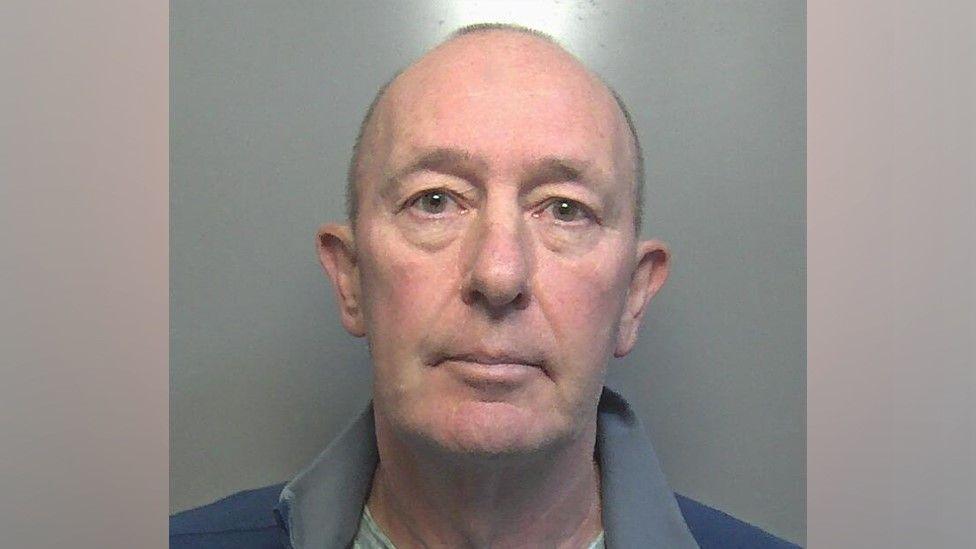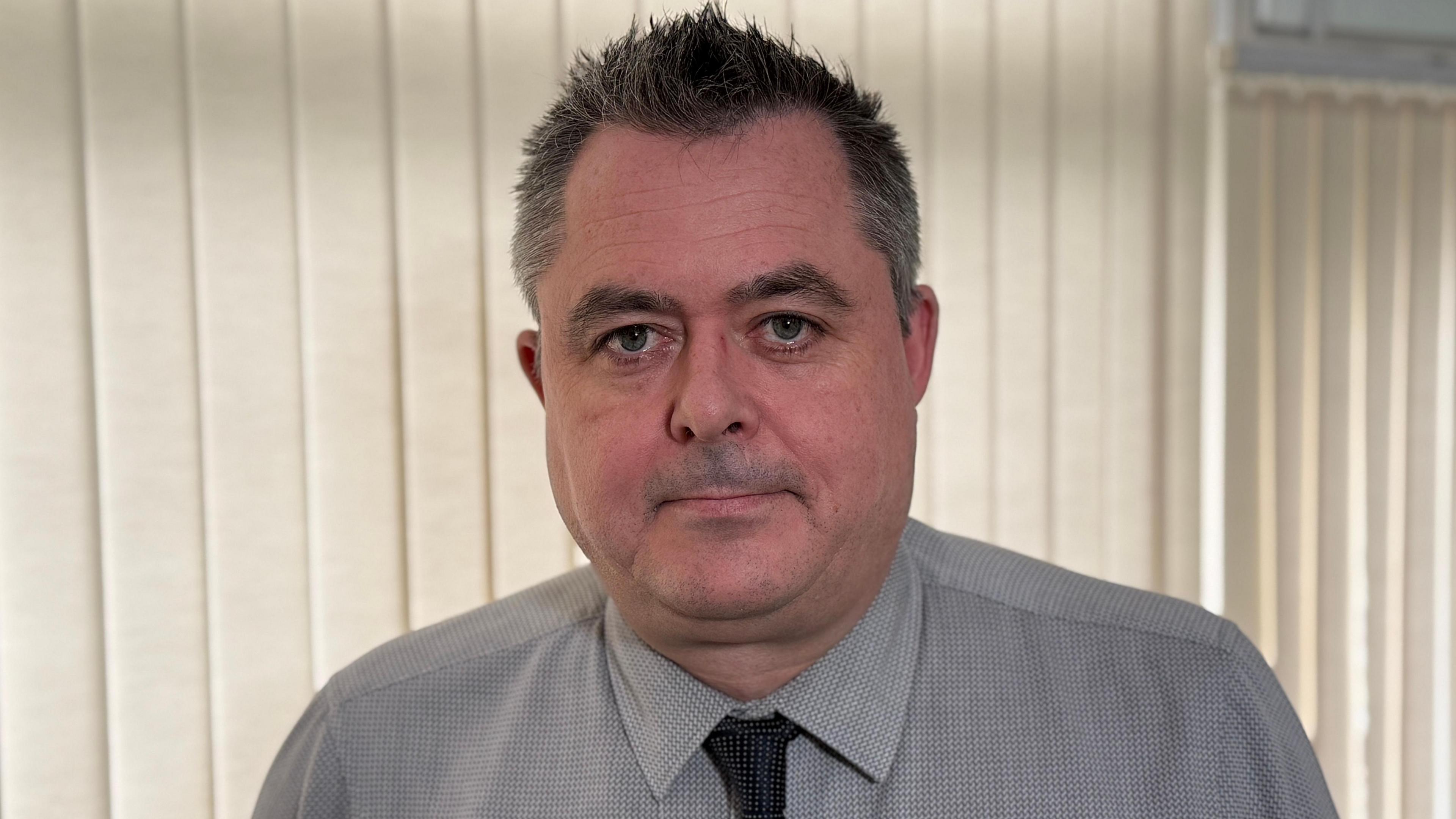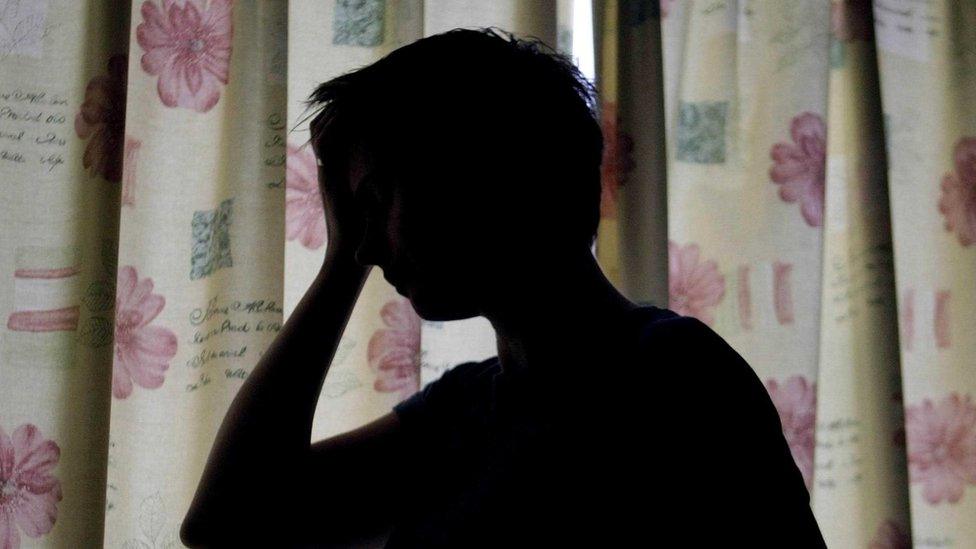'I kept borrowing more and more to pay back the loan shark'

"Pauline" wants to remain anonymous after falling prey to an illegal lender
- Published
A woman is warning other people of the dangers of borrowing from unlicensed lenders after the man who lent her money was jailed.
Pauline (not her real name) initially borrowed £300 from Graham Tomlinson of Baldock, Hertfordshire, who had been operating illegally in the area for several years.
Unable to pay him back, Pauline kept taking out more and more loans from Tomlinson, eventually borrowing about £20,000 over nine years - but said she could not bear to calculate how much she repaid in interest.
Jailing Tomlinson, 63, for two years at St Albans Crown Court on Friday, the judge told him: "This is a wicked business, preying on the poor in society."

Graham Tomlinson "preyed on the vulnerable", St Albans Crown Court heard
After a change in family circumstances, Pauline found her salary alone was not enough to pay the bills.
"There was an advert in the local paper from a chap offering loans, so I thought I'd just ring and see," she said.
Tomlinson, who operated under the name GT Finance, offered to meet Pauline away from home to avoid her family finding out.
"We met down the shops, signed some paperwork and I got the money," she said.
She said she felt she could trust Tomlinson because he was "personable, just a nice gentleman... polite".
She took out her first loan in about 2006. After borrowing an initial £300, she had to pay back £540 over four months.
"It was just to catch up with the bills and have a bit of leeway for some shopping," she said.
"But then, three weeks down the line, you were still paying this chap back and you haven't got enough again, so you borrow more."
Details of support with debt are available at BBC Action Line

Pauline borrowed money after her husband lost his income and she needed to cover bills
Pauline said Tomlinson would turn up at her workplace to collect the payments.
"I was trying to keep it quiet from everybody," she said.
"He'd turn up in my lunch break. It's embarrassing but then you feel stupid and you don't really know where to turn.
"You're at a point where you can't get out of it because you've got to pay him back. It's a vicious circle."
Under the law, anyone offering credit to customers must be authorised by the Financial Conduct Authority (FCA), external and follow strict rules.
For much of the time he lent money to Pauline, Tomlinson was licensed by the FCA to offer payday loans.
This meant he had to carry out affordability checks on borrowers and offer protections if they fell behind with repayments.
In 2020, however, he stopped renewing his licence but carried on lending illegally to hundreds of people.
One eventually raised a complaint with their local Citizens Advice Bureau, which was passed to the Illegal Money Lending team (IMLT) to investigate.
The IMLT is a national team set up more than 20 years ago to investigate and prosecute loan sharks and support borrowers.
It discovered that Tomlinson had issued 4,331 loans totalling just over £1m to 386 people, including Pauline, during the period between July 2020 and October 2023, when he was unlicensed.
He generally charged interest at a flat rate of 50%, and the repayments made to him totalled more than £1.5m.

Dave Benbow from the Illegal Money Lending Team said loan sharks operated on "greed"
Tomlinson pleaded guilty to unauthorised money lending, and money laundering.
The judge gave him credit for his guilty pleas, jailing him for two years in total.
He also asked any victims who wanted compensation for the high interest rates they had been charged to come forward.
The court heard Tomlinson had an annual income of £125,000.
The judge told him: "You were preying on those who were vulnerable. They were on benefits and you were extracting massive interest rates off them.
"You were in breach of the Proceeds of Crime Act. You were using the proceeds to fund further loans or to pay for lavish holidays.
"Your lavish lifestyle has come to an end."
He ordered confiscation of Tomlinson's assets totalling about £540,000, which the court heard would be paid by selling his properties, re-mortgaging his family home and using his pension.
Dave Benbow, head of the IMLT, said: "Loan sharks operate on greed. They don't care about their borrowers."
Tomlinson had set up an automated repayment system so he could take money out of customers' bank accounts at any time.
"Even if they hadn't got the full amount of money in the bank, he would just take that money out which would then potentially leave them in arrears on other bills or going into an overdraft in their own bank. which would ultimately see them going back to Mr Tomlinson to borrow more money," said Mr Benbow.
"It afforded Mr Tomlinson the lifestyle he had... going on holiday to really luxurious, exotic places while his victims are at home, struggling just to pay for food bills."
When Pauline's husband died following an illness, she borrowed yet more from Tomlinson to pay for funeral costs.
Much of the money she borrowed was to meet the cost of repayments.
Her advice to anyone thinking of borrowing money from someone without checking their credentials is not to do it.
"Don't get on this wheel; it's scary and there's no getting off," she said.
"No-one needs to be in that situation. I haven't told my family because they'd be horrified, and they'd feel bad that I hadn't told them."
With few banks or building societies willing to lend to those facing financial difficulties already, many struggling people turn to loan sharks.
The Centre for Social Justice discovered that more than a million people in England alone, external were paying illegal money lenders.
Financial cooperatives known as credit unions are an ethical and safe alternative to loan sharks for those seeking access to credit.
Robert Kelly, chief executive of the Association of British Credit Unions Limited, said: "Many people deserve fairer and more responsible financial products and services that are affordable and reliable.
"Credit unions have a proven track record of building financial resilience in communities and workplaces across the country – that typifies the credit union business model as the ethical alternative within the financial services marketplace."
Follow Beds, Herts and Bucks news on BBC Sounds, Facebook, external, Instagram, external and X, external.
Related topics
More related stories
- Published1 February 2024

- Published3 November 2023
